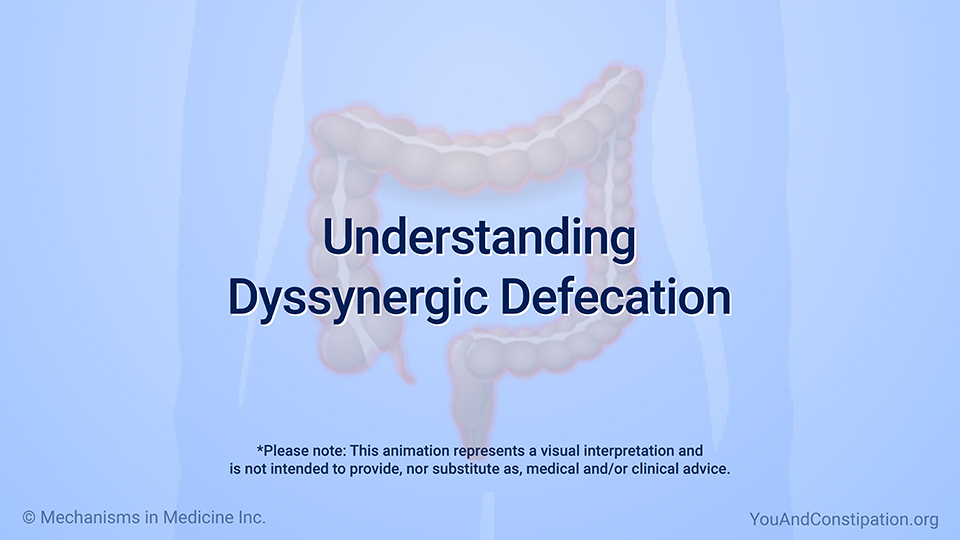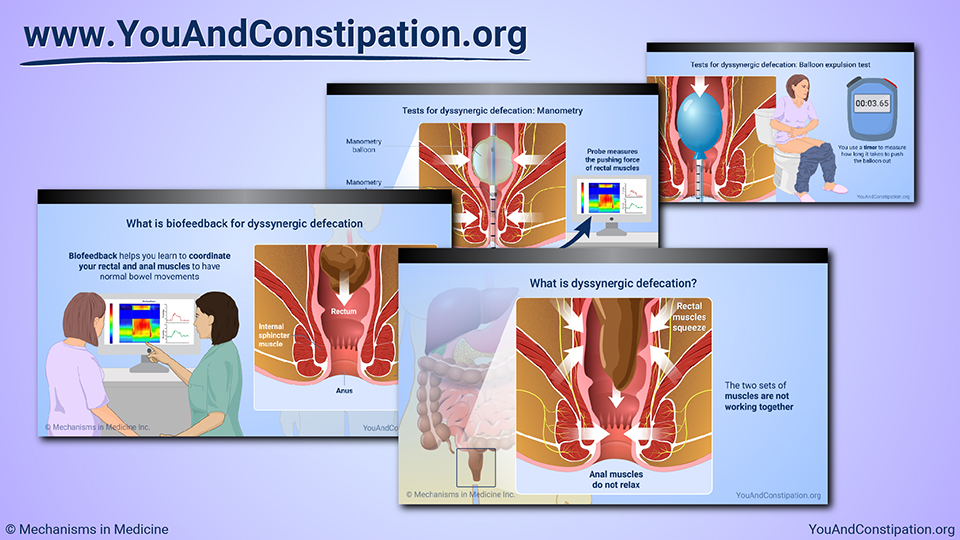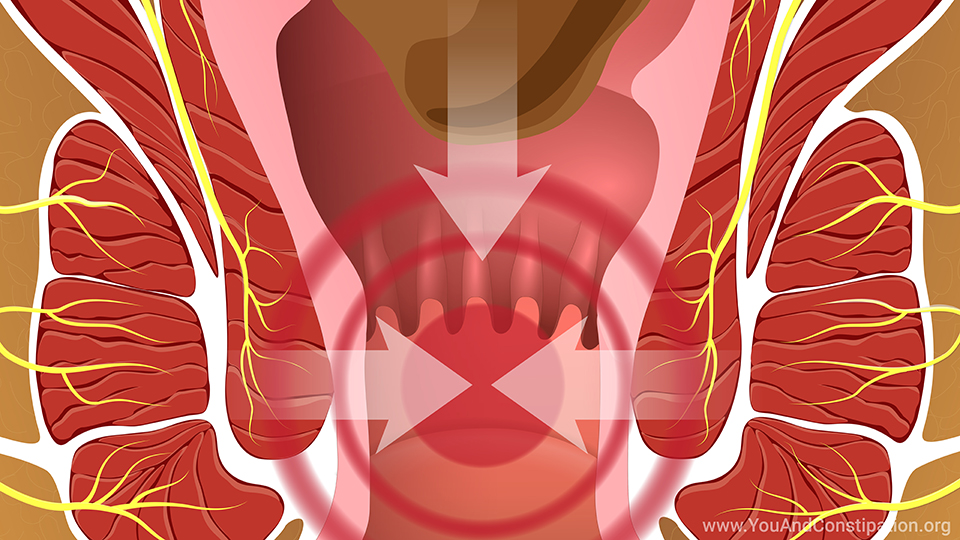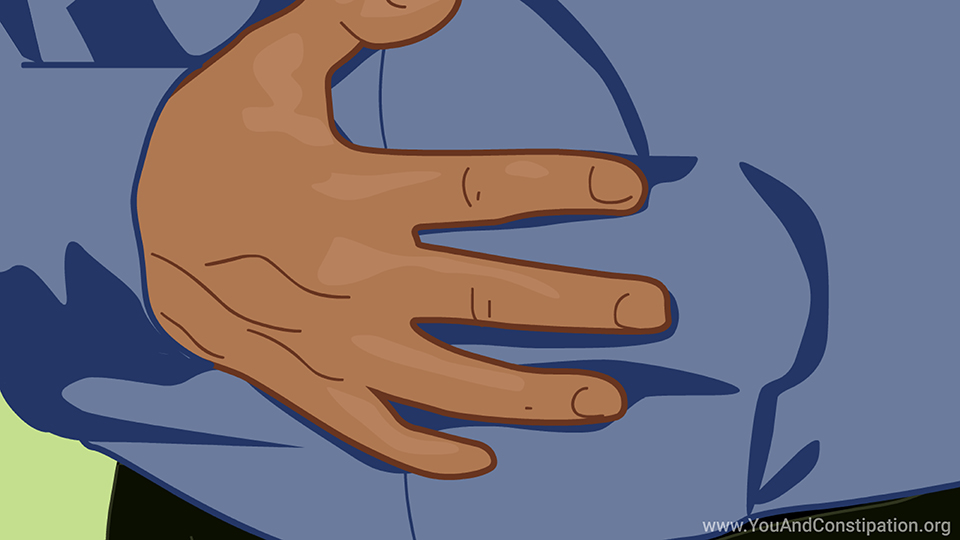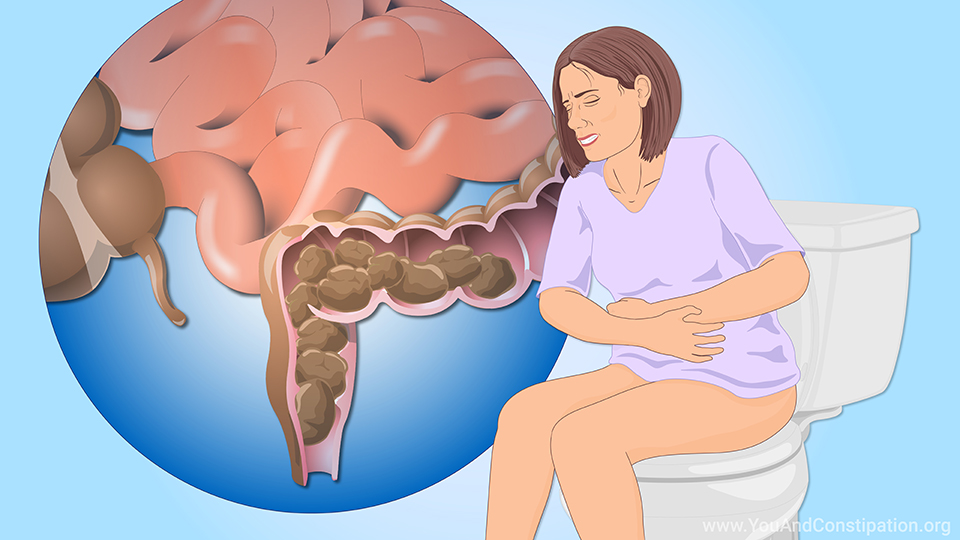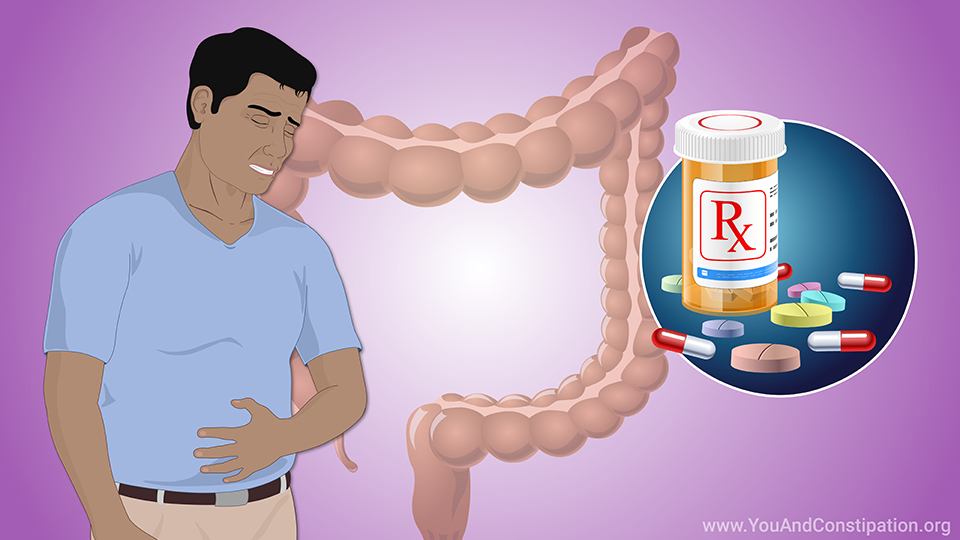Understanding Dyssynergic Defecation
*Please note: This slide show represents a visual interpretation and is not intended to provide, nor substitute as, medical and/or clinical advice.
What is dyssynergic defecation?
Dyssynergic defecation, or DD, is one cause of constipation.
When you have a bowel movement, the muscles of your rectum must squeeze to push it out. At the same time, the muscles of your anus, just below the rectum, need to relax to let the bowel movement out.
In dyssynergic defecation, these two sets of muscles are not working together. The rectal muscles may squeeze, but the anal muscles do not relax. Or the anal muscles relax but the rectal muscles do not push enough.1
What are the symptoms of dyssynergic defecation?
The symptoms of dyssynergic defecation include taking a long time to have a bowel movement, going often but feeling like you never completely empty your bowels, having hard bowel movements, or feeling like you need to use your fingers to assist with bowel movements.
What causes dyssynergic defecation?
Dyssynergic defecation can be caused by childbirth, surgery, injury, and other problems.
Whatever the original cause, dyssynergic defecation develops when the muscles and nerves of your anus, rectum, and abdomen are not coordinated.
Is dyssynergic defecation serious?
Dyssynergic defecation is not life-threatening, but it can be uncomfortable. Three to 6 of every 10 people with constipation have dyssynergic defecation.
Is dyssynergic defecation serious?
If you don't know you have it, you may spend a lot of money on medication and treatment to try to help your constipation.
How do healthcare providers diagnose dyssynergic defecation?
Healthcare providers diagnose dyssynergic defecation by asking about your symptoms and bowel movement habits and examining your anus and rectum.
How do healthcare providers diagnose dyssynergic defecation?
Your provider may also ask about your health and medical history, including any injuries or surgery.
Tests for dyssynergic defecation: Manometry
You may also have a test called manometry to diagnose dyssynergic defecation. This test uses a pencil-sized probe in the anus and rectum. The probe measures the pushing force of your rectal muscles and the ability of your anal muscles to relax.
Tests for dyssynergic defecation: Balloon expulsion test
A test called the balloon expulsion test uses a small, water-filled balloon placed in your rectum. You use a timer to measure how long it takes to push the balloon out.
Tests for dyssynergic defecation: Defecography
In a test called defecography, a technician puts some paste in your rectum and you sit on a toilet seat to push it out. X-rays or other imaging tests are taken while you do this to show how your body is working.
Tests for dyssynergic defecation: Colon transit test or marker test
Finally, you might do a "marker test" to measure if food is moving through your digestive system at a normal speed. You swallow a capsule containing tiny "markers" that come out in your bowel movements.
Later, you have an X-ray to see how many markers are still inside you. The more you have, the slower your digestive system is working. Many people with dyssynergic defecation have a slow digestive system.2
How is dyssynergic defecation treated?
If standard treatments for constipation, such as exercise and laxatives, do not work, you may benefit from a type of physical therapy called biofeedback.
What is biofeedback for dyssynergic defecation?
Biofeedback helps you learn to coordinate your rectal and anal muscles to have normal bowel movements. Studies show it is very effective at treating dyssynergic defecation.
How biofeedback works
Biofeedback uses a small probe that picks up muscle activity. When muscles contract and relax, you hear a sound or see the muscle effort on a screen you can watch.
How biofeedback works
With several biofeedback sessions, you learn how to recognize which muscles are squeezing and relaxing and how to coordinate them.
How long does biofeedback take to work?
Most people need about 6 one-hour sessions of biofeedback for their dyssynergic defecation to improve. This may include some practice at home. You might see your physical therapist again later to check your progress.3
Other dyssynergic defecation treatments
Other treatments for dyssynergic defecation include surgery and Botox injections to relax the anal muscles, especially for children.4 However, since children may need to learn better bowel movement habits, biofeedback is often the best option for them.
Questions for your healthcare provider
If you think dyssynergic defecation might be causing your constipation, ask your healthcare provider about it. You might also want to ask if biofeedback is available in your area.
Asking questions and sharing what you have learned is the best way to get the treatment you need.
References
-
Rao SS. Dyssynergic defecation. Gastroenterol Clin North Am. 2001 Mar;30(1):97-114.
doi: 10.1016/s0889-8553(05)70169-2. PMID: 11394039.
-
Rao SS, Tuteja AK, Vellema T, Kempf J, Stessman M. Dyssynergic defecation: demographics, symptoms, stool patterns, and quality of life. J Clin Gastroenterol. 2004 Sep;38(8):680-5.
doi: 10.1097/01.mcg.0000135929.78074.8c. PMID: 15319652.
-
Rao SS, Benninga MA, Bharucha AE, Chiarioni G, Di Lorenzo C, Whitehead WE. ANMS-ESNM position paper and consensus guidelines on biofeedback therapy for anorectal disorders. Neurogastroenterol Motil. 2015 May;27(5):594-609.
doi: 10.1111/nmo.12520. Epub 2015 Apr 1. PMID: 25828100; PMCID: PMC4409469.
-
Rao SS, Patcharatrakul T. Diagnosis and Treatment of Dyssynergic Defecation. J Neurogastroenterol Motil. 2016 Jul 30;22(3):423-35.
doi: 10.5056/jnm16060. PMID: 27270989; PMCID: PMC4930297.
This slide show provides an overview of
dyssynergic defecation, including
symptoms,
causes, and how it is
diagnosed and treated. You can learn about different tests for dyssynergic defecation, including
manometry,
balloon expulsion tests,
defecography, and
colon transit tests. You can also learn about the role of
biofeedback in training people to develop healthy bowel movement patterns. If you think dyssynergic defecation might be causing your constipation, ask your healthcare provider about it.
-
Share with family and friends:
Click here to take our SURVEY
Your feedback is important to us! We will use your feedback to develop future areas of content about constipation which will help other patients, caregivers and families.
